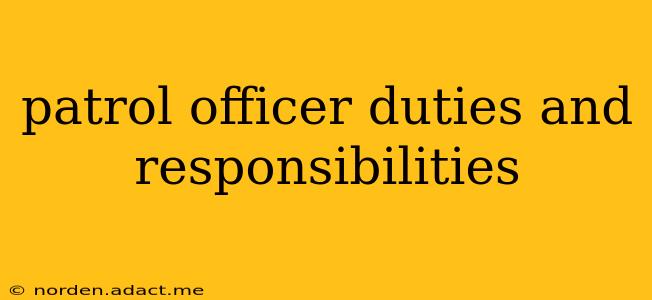Patrol officers are the backbone of most law enforcement agencies. Their duties and responsibilities are diverse and demanding, requiring a unique blend of skills, training, and dedication. This comprehensive guide delves into the multifaceted role of a patrol officer, covering everything from daily tasks to critical incident response.
What are the Main Duties of a Patrol Officer?
The core duty of a patrol officer is to maintain law and order within their assigned area. This involves a wide range of activities, including:
- Responding to calls for service: This is the most common task, encompassing everything from minor traffic violations to serious crimes. Officers must assess situations quickly, determine the appropriate course of action, and often take immediate action to ensure public safety.
- Preventing crime: Patrol officers actively patrol their assigned areas, both visibly and covertly, to deter criminal activity. This includes maintaining a high police presence, engaging with the community, and identifying potential crime hotspots.
- Investigating crimes: Officers often conduct preliminary investigations at crime scenes, gathering evidence, interviewing witnesses, and identifying suspects. They then work with detectives to further the investigation.
- Making arrests: When warranted, patrol officers make arrests for a variety of offenses, ensuring suspects are processed according to established procedures.
- Issuing citations: Officers issue citations for traffic violations and other infractions, enforcing laws and ensuring public safety.
- Providing assistance to the public: This encompasses a wide range of tasks, from helping lost individuals to providing medical assistance or directing traffic during emergencies. Patrol officers are often the first responders to accidents and other incidents.
- Maintaining order and peace: Officers work to de-escalate tense situations, mediate disputes, and restore order in the community. This requires strong communication and interpersonal skills.
- Completing paperwork: Extensive paperwork is a significant part of a patrol officer's job, including incident reports, arrest reports, and other documentation required by the department.
What are the Responsibilities of a Patrol Officer?
Beyond the specific duties, patrol officers have several key responsibilities:
- Adherence to the law: Patrol officers must always act within the bounds of the law, upholding the Constitution and respecting the rights of all individuals.
- Maintaining professionalism: Officers are expected to maintain a high standard of professionalism in their interactions with the public, exhibiting courtesy, respect, and impartiality.
- Continual training and development: The law enforcement field is constantly evolving, requiring officers to participate in regular training to stay updated on procedures, laws, and best practices.
- Physical fitness and health: The job demands physical stamina and strength, requiring officers to maintain a high level of fitness.
- Teamwork and collaboration: Patrol officers work as part of a team, collaborating with other officers, detectives, and support staff to achieve common goals.
- Ethical conduct: Integrity and ethical conduct are paramount, requiring officers to uphold the highest standards of honesty and accountability.
What are the Typical Working Conditions for a Patrol Officer?
The working conditions for a patrol officer can be challenging and unpredictable. They often work long hours, including nights, weekends, and holidays. They may face dangerous situations, exposure to hazardous materials, and stressful encounters. The job requires mental resilience and the ability to handle high-pressure situations effectively.
What Skills and Qualities are Important for a Patrol Officer?
Success as a patrol officer requires a unique combination of skills and qualities:
- Communication skills: Excellent verbal and written communication skills are essential for interacting with the public, suspects, and colleagues.
- Problem-solving skills: Officers must be able to quickly assess situations, identify problems, and develop effective solutions.
- Decision-making skills: Rapid and accurate decision-making is crucial in high-pressure situations.
- Interpersonal skills: Building rapport and trust with the community is vital for effective policing.
- Physical fitness: The job demands physical stamina and strength.
- Emotional intelligence: The ability to manage emotions and empathize with others is crucial.
How much does a patrol officer make?
Patrol officer salaries vary widely based on location, experience, and the specific law enforcement agency. Researching average salaries in your target area is recommended.
What is the required education and training for a Patrol Officer?
Most agencies require a high school diploma or GED, and many prefer applicants with some college education. Extensive police academy training is mandatory, followed by field training under the supervision of experienced officers.
This comprehensive overview provides a detailed look at the duties, responsibilities, and requirements of a patrol officer's career. While challenging, it's a rewarding profession for those dedicated to serving and protecting their communities.
